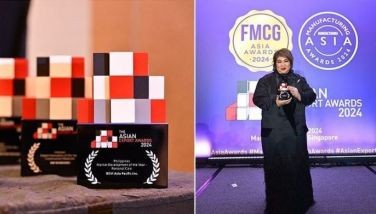Silicon Valley visionary shows way to success
MANILA, Philippines - Just as there are naturally gifted athletes and artists, there are also natural engineers, which the country certainly needs more of to attain progress.
This assertion came from one of the most renowned and respected Filipino engineers, Dr. Diosdado Banatao. His impressive accomplishments give credence to his statements that there are individuals born with the talent for engineering.
Dr. Banatao keeps in touch with his alma mater, Mapúa Institute of Technology (MIT) and its faculty and students. In one of his visiting lectures, he said: “Being a natural at something equates to loving what you do. Most people who are successful at something, love what they do. It is in the loving part that you derive success. And you should not be afraid of taking risks.”
This natural talent and risk-taking led him to produce landmark innovations in the IT field. He is most known for introducing the first system logic chip set for PC-XT and PC-AT that made computers much more powerful, compact and affordable. He also helped develop the first 10-Mbit Ethernet controller chip that made the internet possible. In 1989, he pioneered the local bus concept for PC and in 1990 came up with the first Windows graphics accelerator chip, among many others.
“Dado,” as he is more popularly known, is now considered the Bill Gates of Asia and a Silicon Valley visionary. He is a multimillionaire investor, co-founder of several start-up IT firms, and managing partner of Tallwood Venture Capital, where he employs his keen sense of trends and opportunities in technology solutions – both on the engineering and entrepreneurial sides – to finance innovative ideas and build companies.
The way he rose from his humble beginnings was just as impressive. Born in 1946 to a rice farmer and housekeeper, he grew up in a little farming town in Cagayan Valley, and used to walk barefoot along dirt roads to school. “I came from almost nothing,” he said. “I was fortunate that my parents worked really hard to get us educated in some of the best schools.”
“Mapua should continue to attract the best minds, on the management side, the faculty side, and the raw material side, which are the students,” he said. “It’s good for the students going to Mapua right now that they will get the benefits of ABET accreditation, and they should take advantage of that.”
He also works with various local government agencies to share his ideas on how the Philippines can become more globally competitive, especially in the engineering and IT fields.
“The world’s most advanced economies have gone beyond agriculture by developing and employing the best technologies,” he said. “For the Philippines to advance economically, the country should be capable of creating a lot of globally competitive technologies and products.”
This can only be achieved by emphasizing more science and engineering education. “The government must emphasize better education in math and sciences, and must engage in a lot of risk-taking or investments in technology,” he stressed. “We have to create the opportunities for real, natural engineers to develop and flourish. We may have a long way to go, but we will not stop until we have more than enough pool of technologists who create products and innovations of the future.”
- Latest





























